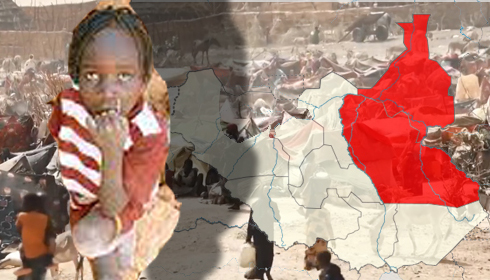
1200 children die from suspected measles and malnutrition in Sudan as civil war continues
The UNHCR, UN Refugee Agency, and WHO have sounded alarm in Geneva recently over the deteriorating health condition in Sudan due to civil war. According to a new report, between May 15 and September 14, around 1,200 refugee children under the age of five perished in nine camps due to suspected measles outbreaks and severe malnutrition.
The agencies said that over 3100 suspected cases and 500 cholera cases have been reported. The condition increases the possibility of an epidemic and makes containment difficult.
"The world has the means and the money to prevent every one of these deaths from measles or malnutrition," the United Nations High Commissioner for Refugees, Filippo Grandi, said in Geneva.
"And yet dozens of children are dying every day—a result of this devastating conflict and a lack of global attention. We can prevent more deaths, but we need money for the response, access to those in need, and, above all, an end to the fighting," he added.
According to the authorities, health facilities are unable to cope due to staff shortages, critical equipment, and recurring epidemics. Attacks on employees, patients, and medical supplies have hampered service delivery and increased mortality.
"Local health workers, with the help of WHO and partners, are doing all they can in very difficult conditions. But they desperately need the support of the international community to prevent further deaths and the spread of outbreaks," said WHO Director-General Dr Tedros Adhanom Ghebreyesus. "We call on donors to be generous and on the warring parties to protect health workers and access to health for all those who need it."
South Sudan's humanitarian partners are experiencing a surge in measles cases and high malnutrition rates, particularly among children under five. The country has reported over 5770 suspected cases and 142 deaths, with half of the affected youngsters not immunised. Between May and July, 103 children were admitted to health institutions for moderate or severe malnutrition, highlighting immunisation inadequacies, particularly among returnees and refugees.
The agencies further stated that Ethiopia's Amhara region is facing a similar crisis with a cholera outbreak in Metema, affecting over 18,000 refugees fleeing Sudan's conflict. As of September 12, eight people have died from cholera, and vaccine stocks are running low, putting refugees at risk. The lack of ambulances, insufficient medical equipment, and a shortage of critical health staff are putting lives at risk. In Chad, nearly 13,000 children below five years old are acutely malnourished, with the number of children admitted to hospitals increasing by 56% since the conflict began. Acute respiratory infections, diarrhoea, and malaria remain the most common illnesses among children. Access to clean drinking water is also a major challenge.
UNHCR and WHO said they are increasing efforts with partners to prevent more deaths in Sudan and across borders. Food delivery is continuing, and approximately 53,000 children under the age of five have received measles vaccinations in camps in Blue and White Nile states.
The agencies further stated that two programmes in Chad have covered 1.2 million children under five while supplying food to fight severe malnutrition therapy to stabilisation centres.